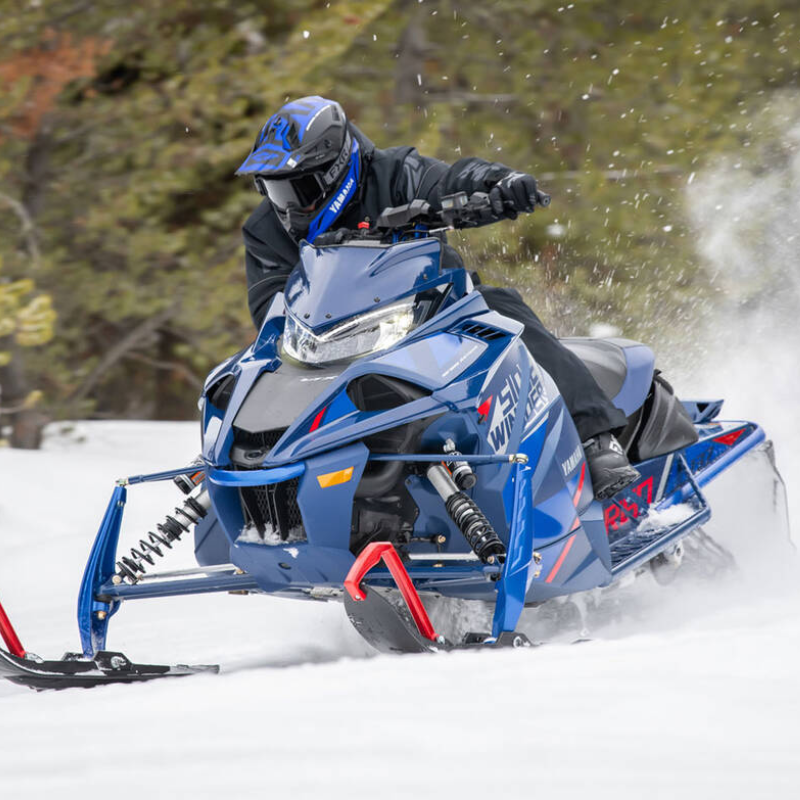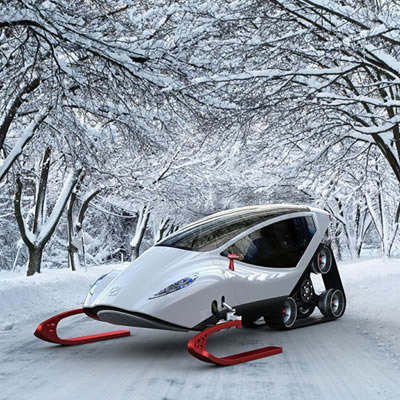The Department of National Defence plans to develop a new stealth snowmobile for covert military operations in Canada's Arctic, with $550,000 set aside to build a prototype.
Ottawa has posted a public tender for a hybrid-electric snowmobile that would allow Canadian Forces soldiers to swoop silently across the frozen landscape. The vehicle would perhaps be the most unconventional tool in the arsenal of a Conservative government promising to beef up Canada's military might in the North.
The nature of these future clandestine assignments is unclear from the federal tendering document. But one thing is clear: silence is priority No. 1. Existing engines apparently aren't up to the job.
"The noise level of an internal combustion engine cannot be reduced to an acceptable level for missions where covertness may be required, especially given the increased propagation of sound in cold, dry, Arctic air," reads the tender, posted last week by National Defence's research and development agency.
"Electric snowmobiles are a potential solution to this problem, eliminating the internal combustion engine and using a much quieter electric motor to drive the track system."
Since coming to power, the Conservatives have gradually increased the Canadian Forces' presence in the resource-rich Arctic. Prime Minister Stephen Harper has made annual trips to the region, where he's appeared in carefully orchestrated photo ops on ice floes as jets screamed overhead.
A government spokeswoman could not immediately provide information as to why the military would need snowmobiles for clandestine operations. But one northern security expert said this could be a signal the government is getting serious about Arctic sovereignty.
Whitney Lackenbauer considers the project a departure from the government's usual in-your-face military approach to the Arctic.
"To me, it very clearly suggests that someone within the Canadian Forces perceives the need to actually have substantive capabilities, rather than simply acting symbolically in the region," said Lackenbauer, a historian at the University of Waterloo.
"Up to this point, as I see it, the focus has very much been on showing the flag. So it's not about keeping your activities quiet, it's about broadcasting it to the world as loudly as you can."
Still, he has no clue what kind of scenarios National Defence has foreseen for it to want—or need—stealth snowmobiles.
"I'd be interested in knowing what the military envisions as being the threats that it's going to encounter with these," he said, speculating they might be useful to stop smugglers or other criminal activities. "I'm at a loss to know what that is."
The tender calls for the snowmobile to have a range of at least 15 kilometres when it operates in its quiet, electric mode at an average speed of 20 kilometres per hour on level snow. The vehicle must also be able to hit a top speed of at least 75 kilometres per hour.
In its gas-power mode, the snowmobile must be able to maintain a speed of 30 kilometres per hour while towing a payload of 250 kilograms on a sled, and it must have a range of 100 kilometres.
"It also must have the ability to switch to 'silent' mode easily and quickly with minimal tools, at which point it can function solely on electrical power," the tender says.
The document says bids cannot exceed $550,000 and a prototype must be completed by March 31, 2013. Hybrid snowmobiles are not yet available from major manufacturers, but a McGill University engineering professor said the idea is on the cusp of commercial breakthrough.
Peter Radziszewski has helped students build experimental electric and hybrid snowmobiles at the school over the last decade. He doesn't see any reason why constructing a hybrid snowmobile to the tender's specifications wouldn't be feasible—as long as the producer can work with the government's tight budget.
Radziszewski said the hefty challenge of maintaining performance in a machine weighed down by two engines and a stack of batteries won't be easy, either.
"It becomes a heavy, heavy snowmobile," he said. "It's very difficult."
Radziszewski highlighted that the electric motor offers environmental benefits of zero emissions—a feature not even raised in the government tender.
"I really don't know what their interests are, but one can well imagine . . . that silence is golden in this particular case," Radziszewski added.
Rob Huebert, a University of Calgary political scientist, called the project good military planning for a region that could see increased activity by smugglers, illegal aliens and organized crime in the future.
"We're starting to see individuals that you would probably want to be able to sneak up on," said Huebert, associate director of the school's Centre for Military and Strategic Studies. "I think what you're going to find is the more you look, the more you find."







